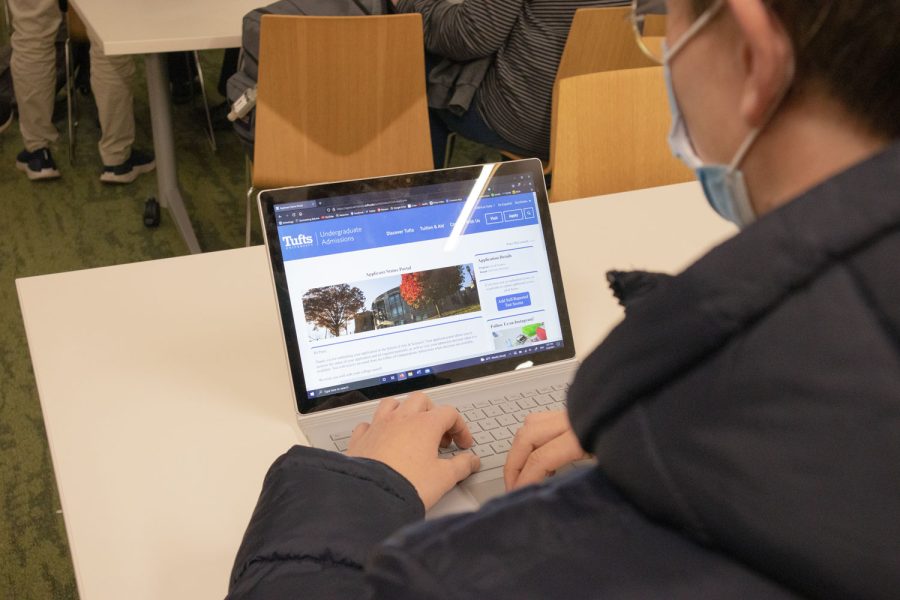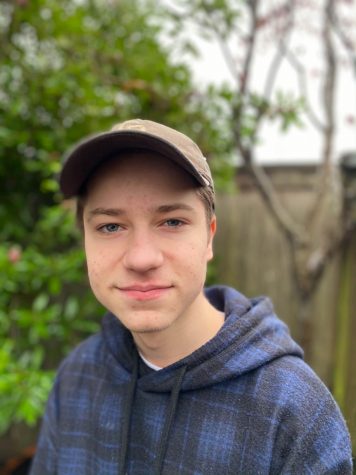Early Bird Gets The Worm
Photo: Matthew Sage
Senior Peter McCormick checks his Tufts application portal. Most schools will release their decisions by November 15th.
 As students across the country fill out applications for college, seniors at University Prep faced more pressure than ever to apply via early decision by early November.
As students across the country fill out applications for college, seniors at University Prep faced more pressure than ever to apply via early decision by early November.
Most schools’ early decision application deadlines were November 1st. If a student applies and is admitted through early decision, they are required to attend that college and cannot apply to any others.
Britten Nelson, associate director of college counseling, worked as a college admissions officer at the University of Puget Sound for seven years before spending the last 15 years at UPrep.
“Historically, I would only encourage early decision if a student had visited and knew it was their favorite school. I didn’t want students just applying early decision just for the sake of it if they’d never visited or if they hadn’t visited enough schools to really know they truly liked that school,” Nelson said.
In recent years, however, Nelson has realized the advantages that early decision can provide.
“I think schools are often not very transparent that their admit rates are much higher for the early decision candidates than they are for the regular decision candidates,” Nelson said.
While Nelson would previously only recommend early decision in select circumstances, her mindset was heavily impacted by the COVID-19 pandemic.
“I had a lot of students who enrolled at schools they never saw in person. They did all their college tours virtually, but it worked out,” Nelson said. “So knowing that students could still make an informed decision without actually stepping foot on campus shifted my mindset a little bit.”
According to Nelson, approximately 50% of this year’s seniors applied under early decision. Peter McCormick is one of those seniors; he was choosing between three schools before settling on Tufts University in Boston, MA.
“I was set on New York University’s film school,” McCormick said. “But as soon as I felt that I’d made that decision and filled out the application, it didn’t feel right anymore.It wasn’t just that I was unsure, but I felt that if I were to apply ED to NYU, then I would be hoping that I wouldn’t get in so that I would have the chance to apply to the other schools that I was also interested in. From there, I decided on Tufts, and that did feel right.”
Despite such a difficult time deciding on where to apply, McCormick never doubted that he would apply early decision.
“It almost felt like it was never even a question,” McCormick said. “My counselor was always asking me, ‘so, where do you think you’ll apply early decision?’ and my parents as well. It was always the question was where, not if, I was going to apply ED.”
McCormick said he noticed an interesting difference between UPrep students and those at other schools — both public and independent — in the area.
“Almost everybody that I’ve talked to at UPrep decided to ED somewhere,” McCormick said. “But then compared to my friends that go to other schools, very few of them decided to apply early decision to any school; it feels like that kind of pressure or expectation isn’t present at public schools.”
Senior Jack Nielsen considered applying early decision, but ultimately chose not to.
“I thought it was a good move, but I’m not a super decisive person, so I was having a lot of trouble choosing schools,” Nielsen said. “I didn’t have the gut feeling I think you should have when you’re going to commit to going to a certain college.”
This decision stressed Nielsen stress after researching the difference in acceptance rates between early decision and regular decision.
“ED is definitely a good thing strategically if you have a place you really have your mind set on, but that’s not everyone’s path,” Nielsen said.
Senior Maylin Gasga also originally planned on applying early decision, but no school stood out enough to make her decision.
“I felt like I was still learning so much about schools,” Gasga said. “I felt like it wasn’t the right time to decide what school I would go to. There are so many factors that go into such a huge decision, and these things can change at any moment.”
After speaking with others, Gasga became even more confident in her decision to not apply under early decision.
“After applying, some of my friends realized they are unsure if that was the school they want to go to,” she said. “I don’t have to second guess my decision; I have more time.”
Your donation will support the student journalists of UPrep.


